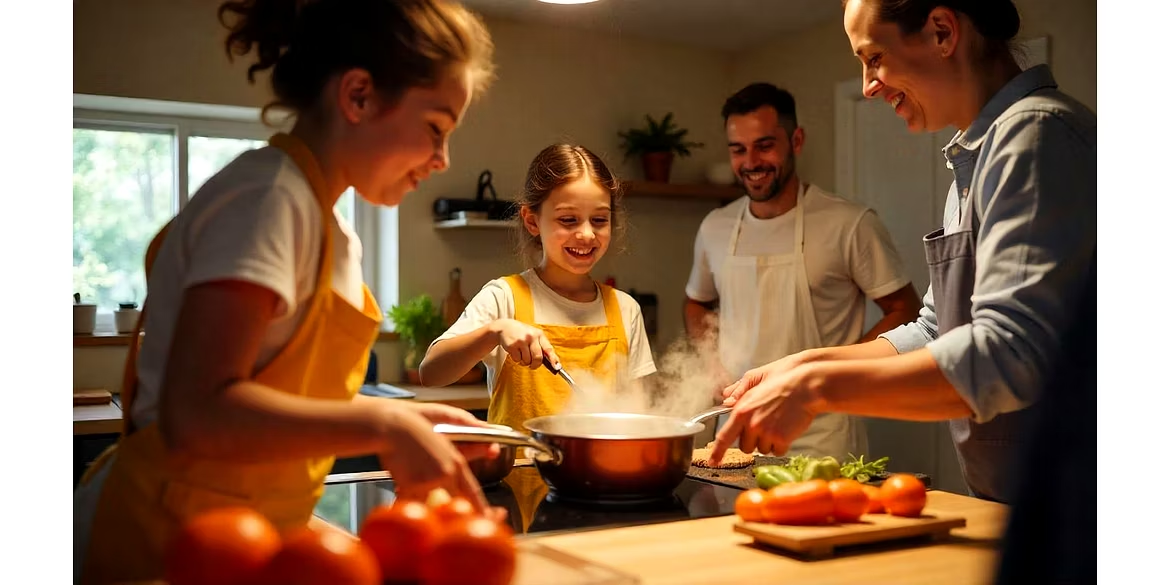- (+91) 9342700300
- ecom@mahavirhomestore.com
- Matcheswala Compound,, Station Road, Opp. Arun Bazaar, Santacruz (West), Mumbai, Maharashtra, India. 400054
© 2020 Mahavir Home Store. All Rights Reserved

Choose Safe Cookware Materials
The first step in safe cooking starts with the materials you use. Selecting non-toxic cookware protects your family from both physical accidents and chemical exposure.
✔️ What to Use:
· Ceramic-coated or stainless steel: Free from harmful chemicals like PTFE and PFOA found in traditional nonstick pans.
· Cast iron: Durable, safe, and offers great heat retention. Just ensure it’s well-seasoned.
· Hard-anodized aluminum: Safer than regular aluminum as it prevents food reactions and leaching.
⚠️ What to Avoid:
· Traditional nonstick pans with toxic coatings that can emit harmful fumes at high temperatures.
· Uncoated aluminum, especially when cooking acidic foods.
Related read: Best Non-Toxic Cookware for Families
Keep Cookware Handles Turned Inward
Prevent accidents by making it harder for curious little hands to grab hot pots and pans.
· Use back burners whenever possible.
· Always turn handles inward to avoid knocks or accidental pulls.
· Choose cookware with heat-resistant, ergonomic handles to reduce the risk of burns.
Avoid Burns from Hot Cookware Surfaces
Burns are among the most common kitchen injuries. Stay safe with these habits:
· Always use oven mitts or pot holders—don’t assume a handle isn’t hot.
· Teach children about a designated “hot zone” near the stove and oven.
· Never leave cooking unattended, even for a minute. If you must step away, turn off the burner.
Store Cookware Safely
Proper storage can prevent falls, breakage, and accidental injuries:
· Keep cookware away from counter edges and out of children’s reach.
· Use drawer organizers or lid racks to avoid clutter and instability.
· Make sure lids are securely stored—they can be tripping or dropping hazards.
Teach Kids Basic Kitchen Safety
Even toddlers can start learning kitchen safety fundamentals when taught the right way:
· Let children help with age-appropriate cooking tasks like washing produce or stirring in bowls.
· Introduce kid-safe kitchen tools designed to minimize risks.
· Talk to them about the dangers of hot pans, boiling liquids, and sharp utensils.
Inspect Cookware Regularly for Wear and Tear
Old or damaged cookware can become dangerous over time.
· Check for cracks or chips—especially in nonstick coatings, which may release toxins.
· Keep cast iron well-seasoned to prevent rust and sticking.
· Replace loose or wobbly handles to maintain control and safety.
Clean Cookware Properly
Improper cleaning techniques can damage your cookware or even make it unsafe.
· Never submerge hot cookware (especially ceramic or cast iron) in cold water to avoid thermal shock.
· Use non-abrasive cleaners on nonstick pans to maintain coating integrity.
· Always dry and store cookware properly after cleaning to avoid rust or bacterial buildup.
Conclusion: Cookware Safety is Family Safety
When you're juggling work, parenting, and meal prep, it's easy to overlook small hazards. But taking the time to choose safe cookware, teach good habits, and properly maintain your tools can prevent injuries and ensure your kitchen is a safe space for everyone.
With these cookware safety tips for families; you can protect what matters most—without sacrificing the joy of cooking.



